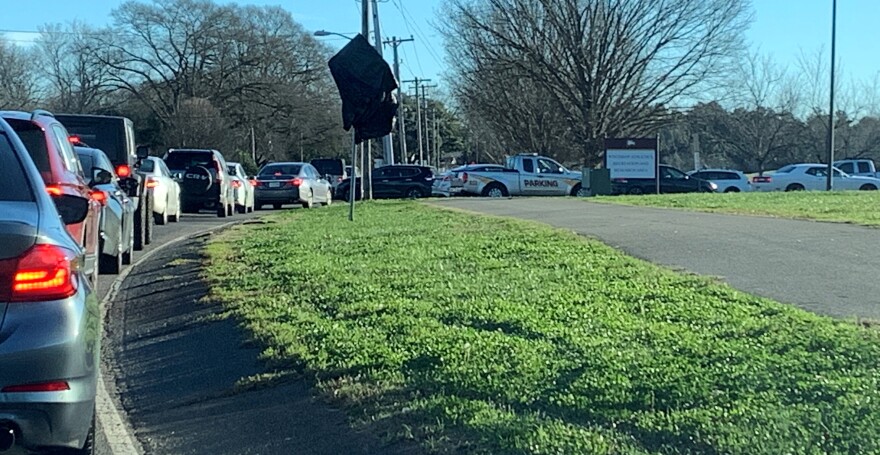South Carolinians are waiting in long lines just to get tested for COVID-19. For example, the line to get tested at the state Department of Health and Environmental Control’s (DHEC) free site at Winthrop University in Rock Hill Friday was an hour.
Just before Christmas, you’d be hard-pressed to see at any one point in the day more than three vehicles at this same site. But as the latest pandemic formula plays out – the holidays, plus underwhelming vaccination rates in the state, plus the uncanny pre-holiday timing of the extremely contagious Omicron variant – lines here are now snaking around this stadium parking lot and out onto Eden Terrace, where vehicles queue up in the dirt and grass for a half-mile, so that the line doesn’t block traffic.
Scenes like this are playing out all over the state, according to DHEC. And while there are roughly 300 testing sites open on a given day in South Carolina – many of which are free, like the one at Winthrop, and many of which are through pharmacies and clinics for a fee – frustratingly long waits to get through testing lines and to get results are sending some to emergency rooms for tests.
‘Please do not visit an ER for a COVID test’
On Wednesday, Dr. Linda Bell, the state’s chief epidemiologist, urged South Carolinians to not go to emergency rooms for COVID tests, in order to avoid burdening already strapped medical facilities.
“Our state’s hospitals, emergency rooms, and doctors are once again overburdened with people seeking care for COVID … the flu, and may other illnesses and injuries,” Bell said. “Please do not visit an emergency room for a COVID-19 test.”
DHEC’s acute hospital bed data ending this week shows nearly 8,200 acute care beds are currently occupied in the state – roughly 84 percent of available beds – and more than 1,500 of those are COVID patients. Compared to the week ending New Year’s Eve, just one week earlier, COVID hospitalizations are 59 percent higher. Meanwhile, 275 COVID patients were in the ICU this week, a spike of just over 36 percent.
On Friday, DHEC issued a statement that pulled few punches. While the agency acknowledged that the long lines and long waits for results – that could take up to three days as opposed to one right now – are frustrating, it said in the statement: “If more people were vaccinated, this surge and subsequent demand for testing likely wouldn't be as drastic as it is. Unvaccinated individuals continue to fuel this pandemic. Imagine if we had these long lines in the queue for getting vaccinated instead of tested.”
As of Friday, DHEC reported that just over 52 percent of eligible South Carolinians had gotten two rounds of a COVID vaccine.
The driving force: Young adults
Dr. Bell said the demographic driving the state’s current surge in COVID infections is young people between the ages of 20 and 40.
“It is that age group that that is comprising the highest number of new cases and is contributing to the spread of the disease,” she said.
Bell is, in addition, concerned that the return to school this past week could exacerbate the spike in cases among young people and children.
“We need more young adults in the 20-to-40 age group and more children, 5 and older, to be fully vaccinated, and to get their boosters as soon as they’re eligible for them,” she said.
Delays in results
On Friday, DHEC reported 12,996 confirmed and probable positive cases of COVID from Jan. 5 – about 300 fewer than Thursday’s report (a record 13,320), but nearly double Wednesday’s report of 6,992. These kinds of numbers are, in part, a direct result of more tests. On Friday, DHEC said that there were about 64,000 tests processed on January 4 and almost 43,800 tests the following day. One month earlier, there were 15,745 tests. The last time testing numbers shot up so sharply was in September, when the Delta variant surge killed more than 1,000 South Carolinians and put dozens in the hospital.
The delays in turnaround time, from 24 to as many as 72 hours after testing, are happening because of swamped testing labs, according to DHEC.
“Our Public Health Lab (PHL) is running at near-max capacity each day for the amount of samples it can process – 2,200 to 2,500,” the agency stated. “DHEC's PHL is capable of processing a very small amount compared to the amount of testing going on in the state right now. About 97 percent of all the test samples in the state are being processed at other labs, not DHEC, and those labs are dealing with the massive influx in testing demand, and that is contributing to delayed turn-around times.”
If you get tested and have not received your results in 72 hours, you may call DHEC's test result call center at 888-697-9004, or email ACC-Testing-CustomerService@dhec.sc.gov.
“But only call/email if it's been more than 72 hours since you got tested and haven't received your results,” DHEC stated. “[We] have seen a dramatic increase in call volume and emails, and staff are working to return messages and voicemails as soon as possible. People should leave one email or one voicemail only to reduce the amount of messages our team is working to respond to.”
Isolation and quarantine of infected lab workers is also contributing to delays, the agency said.
DHEC has also updated its criteria for who should get tested – namely, anyone showing possible COVID symptoms, anyone unvaccinated, and anyone vaccinated who might have been exposed to the virus.



